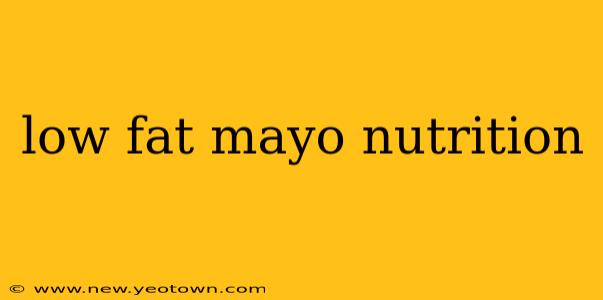Let's be honest, mayonnaise – that creamy, dreamy condiment – isn't always the healthiest choice. But what if I told you there's a lighter side to this beloved spread? Low-fat mayonnaise offers a compromise, allowing you to enjoy the tangy, rich flavor without the hefty calorie and fat count. This journey delves into the nutritional profile of low-fat mayo, exploring its benefits and drawbacks, and addressing some common questions.
What are the Nutritional Benefits of Low-Fat Mayo?
The primary benefit of choosing low-fat mayonnaise over its full-fat counterpart is, unsurprisingly, the lower calorie and fat content. This translates to a reduced impact on your daily calorie intake, making it a more suitable option for those watching their weight or aiming for a healthier diet. While the specific nutritional values vary depending on the brand, generally, low-fat mayonnaise contains significantly less saturated fat, contributing to a healthier heart. It often maintains a similar level of protein and some essential vitamins and minerals, although the quantities are generally lower than in full-fat versions.
How Many Calories are in Low-Fat Mayo?
The number of calories in low-fat mayonnaise can vary depending on the brand and serving size. A typical tablespoon (approximately 15ml) might contain anywhere from 30-50 calories. This is considerably less than a tablespoon of regular mayonnaise, which can easily exceed 100 calories. Always check the nutrition label on the specific brand you're using for the most accurate calorie information.
Is Low-Fat Mayo Healthier Than Regular Mayo?
The "healthier" aspect is a complex question. Low-fat mayo definitely wins in the calorie and fat departments, making it a preferable choice for weight management and cardiovascular health. However, some argue that the process of reducing fat can alter the flavor and texture, sometimes leading to the addition of other ingredients to compensate, potentially affecting the overall nutritional balance. The ideal choice depends on individual health goals and dietary preferences. Consider the overall nutritional profile, factoring in other ingredients in your meals, rather than focusing solely on mayo.
What are the Potential Downsides of Low-Fat Mayo?
While low-fat mayo offers benefits, it's important to acknowledge potential downsides. Some brands might compensate for the reduced fat content with added sugars or other ingredients to improve taste and texture. This can increase the overall sugar content, potentially impacting blood sugar levels. Always carefully examine the ingredient list to ensure it aligns with your dietary needs and preferences. The taste and texture might also be perceived as different, sometimes less creamy or flavorful than regular mayonnaise.
What are the Best Brands of Low-Fat Mayo?
Many reputable brands offer low-fat mayonnaise options. The best brand for you will depend on personal preference, availability, and ingredients. Always check the nutritional information and ingredient list to find a brand that best suits your dietary requirements. Comparing options side-by-side is always a good strategy.
Can I Use Low-Fat Mayo in Baking?
While you can certainly try using low-fat mayonnaise in baking recipes, keep in mind that the reduced fat content might affect the texture and outcome of your baked goods. The lower fat content may result in a drier or less rich texture. Experimentation is key; start by substituting a small portion and adjusting accordingly.
How to Store Low-Fat Mayo?
Like regular mayonnaise, low-fat varieties should be stored in the refrigerator to maintain freshness and quality. Always ensure the container is tightly sealed to prevent spoilage. Refer to the best-before date on the packaging.
In conclusion, low-fat mayonnaise presents a viable alternative for those seeking a healthier option without completely sacrificing flavor. Weighing the nutritional benefits against potential drawbacks, and choosing a brand that aligns with your dietary needs, is crucial. Ultimately, moderation and mindful consumption are key to a balanced and healthy diet.

